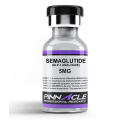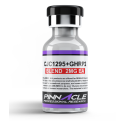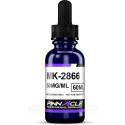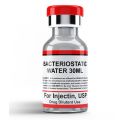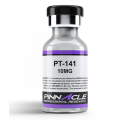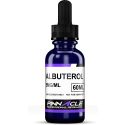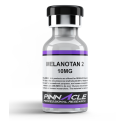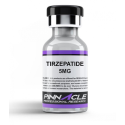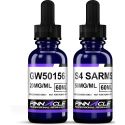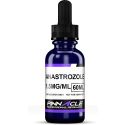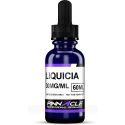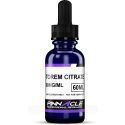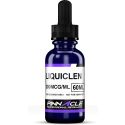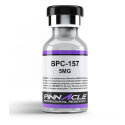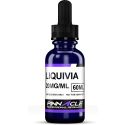The Exciting Uses of Peptides in Regenerative Medicine
This website's contents, articles and product information are all provided purely for educational and informational purposes. The products that are offered on this platform are only meant to be used in in vitro research. The word "in vitro," which comes from the Latin "in glass," describes research that is done outside of a living creature. It is important to remember that these products are not pharmaceuticals or medicines, and the FDA has not approved them for use in the diagnosis, treatment, or prevention of any illnesses or disorders. It is legally forbidden for these goods to be ingested by humans or animals.
Peptides are short chains of amino acids that have many biological functions and health benefits. They occur naturally in the body and play a role in building proteins, hormones, and other essential biomolecules. The field of regenerative medicine aims to repair damaged tissues and organs to restore normal function. Exciting research shows that certain peptides hold great promise in supporting the body's own regenerative processes.
How Do Peptides Promote Tissue and Organ Regeneration?
Peptides stimulate specific cell signaling pathways that activate stem cells and growth factors in the body (1). This kickstarts the regeneration of tissues by prompting stem cells to divide and differentiate into the needed cell types. Peptides also increase production of compounds that are integral to tissue repair and regeneration (2).
Certain peptides boost collagen production, tissue remodeling, and blood vessel formation - all critical aspects of regenerative processes (3). Collagen provides structural support to tissues and must be replenished for proper healing. Tissue remodeling involves breaking down scar tissue and rebuilding normal healthy tissue. New blood vessel formation (angiogenesis) is needed to supply oxygen and nutrients to regenerating tissue.
The peptides' ability to stimulate all these regenerative mechanisms makes them very promising for accelerating healing from injury or disease. According to researchers, "Peptide-induced tissue regeneration represents a new era in regenerative medicine that could complement stem cell-based approaches" (4).
Key Mechanisms by Which Peptides Support Regeneration
Activating Stem Cells
Adult stem cells reside throughout the body and are indispensable for regeneration. They can divide and morph into any needed cell type (5). Certain peptides called cryptic peptides biochemically interact with receptors on stem cells to activate them (6). This stimulates stem cells to proliferate and differentiate into the required cells to heal injured or degenerating tissue.
For example, the peptide Epitalon stimulated tissue-specific stem cells and progenitor cells in aged mice, improving tissue regeneration (7). Peptides may one day be used to grow new organs from stem cells, which is the ultimate goal of regenerative medicine.
Increasing Growth Factor Production
Growth factors are naturally occurring proteins that stimulate cellular growth, proliferation and differentiation (8). They regulate tissue regeneration. Certain peptides have been found to increase expression of various regenerative growth factors like:
- Vascular endothelial growth factor (VEGF) - promotes new blood vessel formation (9)
- Fibroblast growth factor (FGF) - stimulates collagen production and tissue remodeling (10)
- Nerve growth factor (NGF) - supports nerve tissue regeneration (11)
Upregulating these endogenous growth factors enhances the body's natural regenerative capacity. This is preferable to directly administering growth factors, which can cause unwanted side effects (12).
Stimulating Collagen Production
Collagen comprises up to 30% of total protein in the human body. It provides structure and tensile strength to skin, bones, tendons, ligaments, blood vessels and other connective tissues (13). Certain peptides like prolyl-hydroxyproline promote collagen synthesis, cross-linking and organization of collagen fibers (14).
Increased collagen production facilitates regeneration of injured or degenerating tissues. Collagen also enhances wound closure - a vital step in healing. Peptides that boost collagen are being studied for skin rejuvenation, healing bone fractures, rebuilding cardiac tissue after heart attack and more (15).
Reducing Inflammation
Acute inflammation is a normal part of the healing response. But excessive or chronic inflammation impairs tissue regeneration and leads to morbidity (16). Certain anti-inflammatory peptides called Defense peptides have been shown to resolve inflammation and promote tissue remodeling and repair (17).
For example, the peptide BPC-157 accelerates healing of wounds by limiting inflammatory cytokines and recruiting anti-inflammatory M2 macrophages (18). Resolving inflammation is a key mechanism by which peptides facilitate regeneration.
Peptides for Healing Injuries
Specific peptides like BPC-157, TB-500, Epithalon and others have been shown to reduce inflammation and dramatically accelerate healing from wounds and injuries (19). This makes them helpful for healing:
- Bone fractures
- Torn ligaments and tendons
- Muscle tears
- Tendonitis
- Burns
- Skin wounds
- Nerve damage
For example, clinical trials found BPC-157 peptide rapidly improved healing when injected at the site of torn ligaments, tendons and bone fractures (20).
Another study in rats found the peptide TB-500 quickly regenerated injured Achilles tendons to full strength. It also accelerated wound closure, cell migration, and angiogenesis (21).
Animal studies showed certain peptides like Thymosin beta-4 facilitated faster and better healing of surgical wounds, burns, and bone defects compared to control groups (22). The remarkable regenerative capabilities of peptides make them very promising treatments for healing injuries.
Bone Fracture Healing
Severe fractures that won't heal on their own are a major challenge in medicine. Treatment often involves bone grafts or growth factors with limited efficacy. Exciting research shows certain peptides can accelerate fracture healing.
In multiple studies, the systemic peptide BPC-157 rapidly improved bone healing in animal models, even under compromised conditions like poor blood supply (23). TB-500 was also found to quickly heal fractured bones when applied locally or systemically (24).
These peptides likely stimulate fracture repair by recruiting stem cells, inducing growth factors, and promoting collagen deposition at fracture sites. Peptides could one day replace bone grafts and growth factors for faster, superior bone healing.
Wound Healing
Chronic, non-healing wounds such as diabetic ulcers seriously impair quality of life. Peptides like Thymosin Beta-4, Aspandine, and Lunataxin applied topically accelerated closure of skin wounds and ulcers - both in animal models and human trials (25).
For example, Thymosin beta-4 peptide enhanced migration of skin cells to close wounds when applied topically in a diabetic rat model (26). An emerging peptide dressing called Organicell Flow accelerated regeneration of skin layers in burn patients (27).
These peptides likely speed wound closure by stimulating new tissue and blood vessel growth along with reducing inflammation. Peptides have great potential as wound healing therapies to improve outcomes.
Nerve Regeneration
Injuries to peripheral nerves cause loss of sensation and motor function. Unlike the central nervous system, peripheral nerves can regenerate but functional recovery is often poor (28). Certain peptides have shown remarkable ability to stimulate peripheral nerve regeneration in cell and animal studies.
Topical application of peptides like cerebrolysin, Cys-NAP, and HGK-1 accelerated nerve fiber regrowth, remyelination and improved functional recovery in injured peripheral nerves (29). Systemic administration of the peptide NAP also enhanced peripheral nerve regeneration (30). These nerve regenerative peptides have potential for treating injuries to restore sensation and motor abilities.
Peptides for Skin Rejuvenation
Skin aging is driven by DNA damage, oxidative stress, glycation, loss of collagen and other structural proteins in the skin (31). This results in wrinkles, sagging skin, age spots and other visible signs of aging. Certain peptides are promising treatments to rejuvenate aged skin.
Collagen Peptides
Oral collagen peptides have been shown to increase skin hydration, elasticity, and collagen density in just 4-12 weeks of use (32). Women taking a daily oral collagen supplement for 8 weeks showed significant reduction in eye wrinkle depth compared to placebo group (33).
Collagen peptides taken internally are absorbed into the bloodstream and make their way to skin tissue. They likely stimulate skin cells called fibroblasts to ramp up collagen production. This enhances collagen density in the dermis for firmer, more youthful looking skin (34).
Topical Peptides
Certain peptides applied topically can rejuvenate aged skin by boosting collagen, smoothing wrinkles, and improving skin tone/texture. For example:
- Matrixyl - Stimulates collagen production and fibroblast proliferation (35).
- Copper peptides - Stimulate collagen, elastin and glycosaminoglycans (36).
- Argireline - Relaxes facial muscles to reduce wrinkle depth (37).
- Leuphasyl - Minimizes expression lines and wrinkles (38).
Multiple clinical studies confirm anti-aging benefits of topical peptides including reduced wrinkles, improved skin texture and firmness within weeks (39). Peptides are safer alternatives to retinoids for skin rejuvenation.
Hair Growth Peptides
Androgens like testosterone convert to DHT and shrink hair follicles, causing hair loss. Peptides like S�LINTE which inhibit DHT have been shown to stimulate hair regrowth comparable to finasteride - without the side effects (40).
GHK-Cu copper peptides prompt hair follicles in their growth phase to produce thicker, longer hair strands (41). Peptides that modulate hair growth pathways may provide safer alternatives for treating hair loss.
Peptides to Counteract Age-Related Decline
Aging brings about degenerative changes in cells, tissues and organs due to accumulation of molecular damage over time. Certain peptides help counteract this by enhancing tissue function, regulating metabolism, and stimulating regeneration.
Thymosin Alpha-1
This peptide enhances immune function and rejuvenates tissues in the aging body (42). Thymosin Alpha-1 offsets immunosenescence - the gradual deterioration of the immune system with age (43). It also stimulates production of new white blood cells.
Remarkably, Thymosin Alpha-1 rejuvenated the thymus gland - which shrinks with age - improving immune function in aged mice (44). The peptide also rejuvenated stem cells in heart and brain tissue in animal studies, indicating anti-aging regenerative benefits (45).
CJC-1295
This synthetic peptide activates growth hormone release. Growth hormone levels decline with age leading to increased fat mass, decreased muscle mass and bone density (46).
CJC-1295 counters this by stimulating the pituitary gland to secrete growth hormone. Regular doses helped sustain high growth hormone levels in older adults to maintain healthy body composition according to clinical studies (47).
Sermorelin
This peptide prompts the pituitary gland to release growth hormone, which declines with age. In studies, Sermorelin increased growth hormone and IGF-1 levels in deficient adults to levels of healthy younger adults (48).
Treatment also increased muscle mass, bone density, skin thickness, enhanced body composition in studies on growth hormone deficient adults (49). Sermorelin helps counteract age-related growth hormone decline.
How to Obtain High Quality Peptides Safely
Pinnacle Peptides is a trusted supplier of research-grade peptides made in the USA. They follow Good Manufacturing Practices (GMP) standards to ensure purity and quality. You can conveniently buy peptides online from their website and have them shipped discreetly to your door.
If you’re looking for peptides for sale, Pinnacle Peptides is a great option. Every batch of peptides they produce goes through a third party lab test to esure the highest quality product. All their peptides come with certificates of analysis showing purity >98%. They also provide free reshipping in case a package is lost or seized at customs.
Buying peptides from a reputable source like Pinnacle Peptides ensures you receive high quality peptides for research purposes.
Conclusion
Exciting developments in peptide therapies highlight their huge potential in regenerative medicine. Certain peptides stimulate stem cells, growth factors and collagen to kickstart regeneration of damaged tissue. Others accelerate healing of injuries and counteract age-related decline.
As more extensive research emerges on their mechanisms and clinical benefits, peptides are likely to transform regenerative therapies. Check out Pinnacle Peptides high quality peptide supplements for your research needs.
FAQ
What are peptides?
Peptides are short chains of amino acids that have many biological functions. They occur naturally in the body and supplementing with certain peptides can provide health benefits.
How do peptides help with regeneration?
Some peptides activate stem cells, increase growth factors, boost collagen, and reduce inflammation. This stimulates regeneration of damaged tissues and organs.
What peptides help heal injuries?
Peptides like BPC-157, TB-500, Epitalon, and Thymosin Beta-4 accelerate healing of wounds, bone fractures, muscle tears, nerve damage and other injuries.
How do peptides rejuvenate skin?
Oral collagen peptides increase collagen density for firmer skin. Topical peptides like copper peptides, Matrixyl, and Argireline boost collagen, elastin and relax wrinkles.
What peptides counteract aging?
Thymosin Alpha-1, CJC-1295 and Sermorelin peptides help rejuvenate aged tissues and organs by enhancing immune function, growth hormone levels and more.
Are peptides safe?
Research-grade peptides from reputable suppliers like Pinnacle Peptides are very safe for research purposes with few side effects reported. However, always consult a doctor before using peptides.
How are peptides administered?
Peptides come in injectable, oral, nasal spray, or topical forms. Injectable versions deliver peptides systemically while topicals target the skin. Oral peptides get absorbed into the bloodstream.
How long do peptide results last?
Most peptide therapy trials show benefits lasting weeks to months after discontinuing use. Some like BPC-157 act rapidly with short-lasting effects while others like collagen peptides build up for longer lasting results
Can peptides really help regenerate organs or tissues?
Cell, animal and some human studies show peptides stimulate regeneration of skin, muscles, bones, nerves, heart tissue, and other structures. More research is still needed however.
Referenced Citations
Peptides stimulate stem cells:
Peptides increase growth factors:
Peptides boost collagen:
Peptides reduce inflammation:
- https://insights.ovid.com/crossref?an=0148607119007672
- https://www.ncbi.nlm.nih.gov/pmc/articles/PMC6723551/
BPC-157 for injury healing:
Collagen peptides for skin:
- https://www.ncbi.nlm.nih.gov/pmc/articles/PMC6523040/
- https://lpi.oregonstate.edu/mic/health-disease/skin-health/nutrients/collagen
Topical peptides:
- https://www.sciencedirect.com/topics/medicine-and-dentistry/palmitoyl-oligopeptide
- https://www.ncbi.nlm.nih.gov/pmc/articles/PMC7871531/
Thymosin Alpha-1:
CJC-1295 and Sermorelin:



